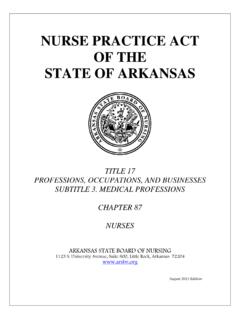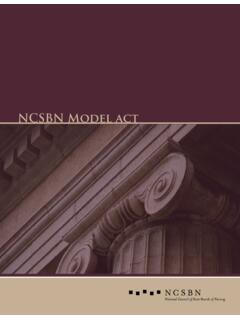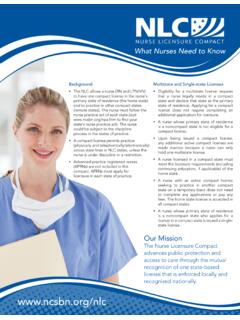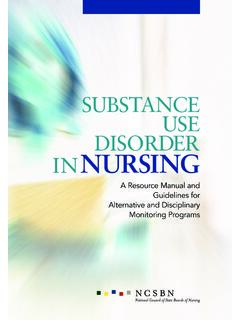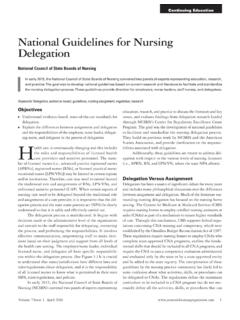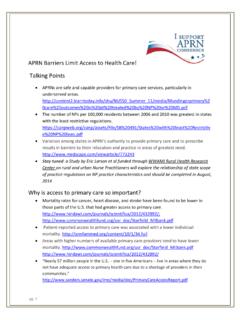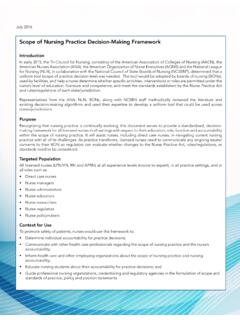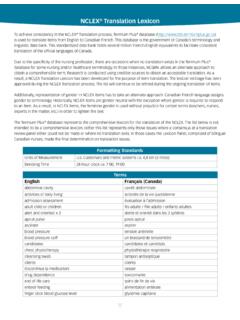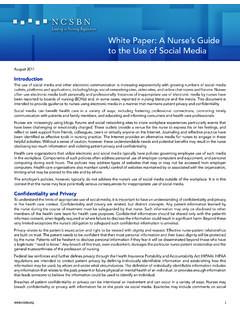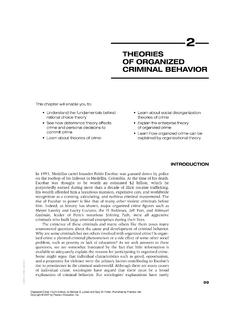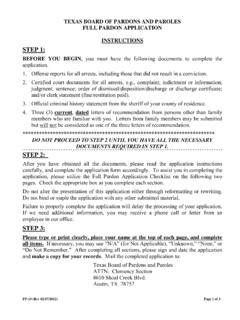Transcription of CRIMINAL HISTORY AND NURSE LICENSURE - NCSBN
1 CRIMINAL HISTORY AND. NURSE LICENSURE . BY DUSTY JOHNSTON, GENERAL COUNSEL, TEXAS BOARD OF NURSING. Introduction Through the development of objective guidelines related to CRIMINAL conduct, the Texas Board of Nursing attempts to ensure consistency and fair consideration of CRIMINAL HISTORY information in licensing and disciplinary decisions IS THE CHARACTER OF NURSES RELEVANT? DEC. 21, 2015 (PRNEWSWIRE-USNEWSWIRE). ACCORDING TO ANNUAL GALLUP SURVEY, AMERICANS TRUST. NURSES MORE THAN ANY OTHER PROFESSION (14 YEAR IN A ROW).
2 TH. NURSES ARE VIEWED AS HAVING VERY HIGH OR HIGH ETHICAL. AND HONESTY STANDARDS BY 85 PERCENT OF PUBLIC, A FULL 17. POINT HIGHER THAN ANY OTHER PROFESSION. PROFESSIONAL CHARACTER OF NURSES. DEC. 21, 2015 (PRNEWSWIRE-USNEWSWIRE). ETHICS OF PROFESSION. (PERCENTAGE VERY HIGH OR HIGH ). TOP SIX. NURSES 85. PHARMACISTS 68 (-17 PTS). MEDICAL DOCTORS 67. HIGH SCHOOL TEACHERS 60. POLICE 56. CLERGY 45. PROFESSIONAL CHARACTER OF NURSES. HONESTY AND ETHICS OF PROFESSION. (PERCENTAGE VERY HIGH OR HIGH ). BOTTOM 6. STOCKBROKER 13 (+6 PTS).
3 ADVERTISING PRACTITIONERS 10. CAR SALESPEOPLE 8. MEMBERS OF CONGRESS 8. TELEMARKETERS 8. LOBBYISTS 7. OTHER. LAWYERS 21 (-64, +14). Is the public perception of nursing based on misconceptions or reality? Professional character is a requirement for LICENSURE in Texas NURSING PRACTICE ACT. TEX. OCC. CODE SEC. An applicant for LICENSURE must demonstrate: a) Good professional character and b) Successful completion of accredited nursing program c) Pass a LICENSURE Exam CRIMINAL HISTORY RELEVANT TO EVALUATION OF. PROFESSIONAL CHARACTER.
4 A) Tex. Occ. Code, Chapter 53: Consequences of CRIMINAL Convictions on Occupational Licenses (applies to all occupational licensing agencies). b) NURSE Practice Act. Tex. Occ. Code (b)(3): It is grounds for disciplinary action or denial of license a conviction for, or placement on deferred adjudication community supervision for a felony or for a misdemeanor involving moral turpitude c) Board Rule (22 Tex. Admin. Code ). LICENSURE of Individuals with CRIMINAL HISTORY TEX. OCC. CODE SECTION (B)(3). FELONY OR MISDEMEANOR INVOLVING MORAL TURPITUDE.
5 (b) A person is subject to denial of a license or to disciplinary action under this subchapter for: **. (3) a conviction for, or placement on deferred adjudication community supervision or deferred disposition for, a felony or for a misdemeanor involving moral turpitude; . Note: In 2009, section NPA was enacted that establishes a time limited bar to LICENSURE for serious crimes, such as murder, rape and aggravated assault. TEX. OCC. CODE : AUTHORITY TO REVOKE, SUSPEND, OR DENY LICENSE. a) A licensing authority may suspend or revoke a license, disqualify a person from receiving a license, or deny to a person the opportunity to take a licensing examination on the grounds that the person has been convicted of a felony or misdemeanor that directly relates to the duties and responsibilities of the licensed occupation.
6 B) A license holder's license shall be revoked on the license holder's imprisonment following a felony conviction, felony community supervision revocation, revocation of parole, or revocation of mandatory supervision. TEX. OCC. CODE CH. In determining whether a CRIMINAL conviction directly relates to an occupation, the licensing authority shall consider: (1) the nature and seriousness of the crime;. (2) the relationship of the crime to the purposes for requiring a license to engage in the occupation (3) the extent to which a license might offer an opportunity to engage in further CRIMINAL activity of the same type as that in which the person previously had been involved; and (4) the relationship of the crime to the ability, capacity, or fitness required to perform the duties and discharge the responsibilities of the licensed occupation.
7 TEX. OCC. CODE CH. ADDITIONAL FACTORS FOR LICENSING AUTHORITY TO CONSIDER. (a) In determining the fitness to perform the duties and discharge the responsibilities of the licensed occupation of a person who has been convicted of a crime, the licensing authority shall consider, in addition to the factors listed in Section : (1) the extent and nature of the person's past CRIMINAL activity;. (2) the age of the person when the crime was committed;. (3) the amount of time that has elapsed since the person's last CRIMINAL activity.
8 (4) the conduct and work activity of the person before and after the CRIMINAL activity;. (5) evidence of the person's rehabilitation or rehabilitative effort while incarcerated or after release; and (6) other evidence of the person's fitness Sec. GUIDELINES. (a) Each licensing authority shall issue guidelines relating to the practice of the licensing authority under this chapter. The guidelines must state the reasons a particular crime is considered to relate to a particular license and any other criterion that affects the decisions of the licensing authority.
9 WHAT TYPES OF CRIMES RELATE TO NURSING? BOARD RULE: 22 TEX. ADMIN. CODE Offenses against the person, , homicide, kidnapping, sexual offenses, and assaultive offenses Offenses against property, , robbery, burglary and theft, etc. Offenses involving fraud or deception Offenses involving lying and falsification Offenses involving the delivery, possession, manufacture, or use of, or dispensing, or prescribing a controlled substance, dangerous drug, or mood-altering substance GENERAL RATIONALE FOR WHY. MOST OFFENSES RELATE TO NURSING.
10 22 TEX. ADMIN. CODE SEC. Nurses have access to persons who are vulnerable by virtue of illness or injury;. Nurses have access to persons who are especially vulnerable including the elderly, children, the mentally ill, sedated and anesthetized patients, those whose mental or cognitive ability is compromised and patients who are disabled or immobilized;. Nurses provide care to critical care, geriatric, and pediatric patients who are particularly vulnerable given the level of vigilance demanded under the circumstances of their health condition.
